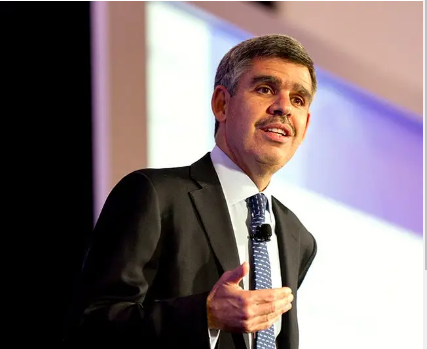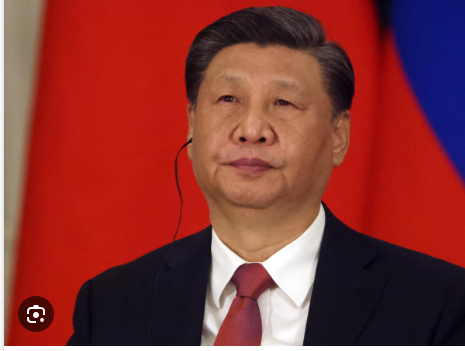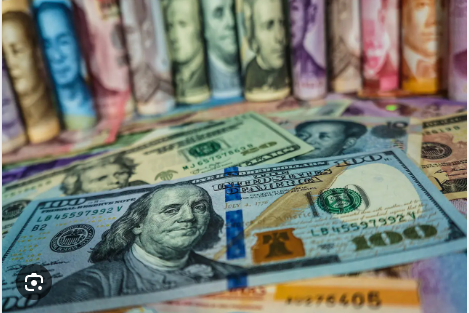
Mohamed ElErian: China may never become the largest economy in the world

Dr. Mohamed ElErian، the Allianz chief economic advisor stated that China may never become the world's biggest economy and has thrown out its old playbook as China's growth model is no longer suited to the global economy as well as cannot count on globalization to rescue its faltering growth model، while its exports have fallen، and growth in Europe and the US will likely be muted for the foreseeable future.

Dr. Mohamed ElErian، the Allianz chief economic advisor wrote in the Financial Times that it's highly unlikely that China will implement large-scale stimulus، markets shouldn't expect China's previous rate of growth to come back and despite what many may continue to tell you، it is no longer a given that China will become the largest economy in the world، as well as bets that the Chinese economy still has a shot at reaching the top might have to be reconsidered.
Dr. Mohamed ElErian: China will never overtake the US
Top economist Mohamed ElErian assured that Beijing's approach towards the current slump has dampened views that it will overtake the US، though blowout growth of past decades has helped China become the second-largest economy in the world.

Dr. Mohamed ElErian indicated that it is time for the markets to recognize that China is not reverting to its old economic and financial playbook، and its return as a powerful driver of global economic growth is unlikely in the near future but economic performance is likely to remain lackluster for the remainder of 2023 and the first half of 2024.

Mohamed ElErian، an Egyptian-American economist and businessman، affirmed that after China lifted pandemic restrictions late last year، the economy saw a brief rebound early this year، but since then، consumption، industry activity، investment، and exports have been disappointing، while youth employment hit record highs and prices have tipped into deflationary territory.
China is unlikely to implement a large-scale stimulus to uplift its economy
Dr. Mohamed ElErian، President of Queens' College، Cambridge، and chief economic adviser at Allianz، the corporate parent of PIMCO where he was CEO and co-chief investment officer since 2014، expects that China's authorities is unlikely to implement a large-scale stimulus program to uplift its economy and fuel domestic spending، though analysts and investors have loudly voiced hopes that Beijing 's authorities do so in the face of larger structural issues.

He explained that's is unlikely because previous stimulus strategies are responsible for high debt levels now seen in China's local governments and teetering property market، so that in place of this، Beijing 's authorities have implemented a series of smaller-level measures.

Dr. Mohamed ElErian. the Allianz chief economic advisor and Chair of Gramercy Fund Management added that leaders are further unlikely to pursue traditional stimulus، out of a worry that continued reliance on it would increase the chances China would fall into the middle-income trap and also encourage corruption.
Beijing is likely to continue with smaller-level measures
He predicted that Beijing، instead، is likely to continue with smaller-level measures، while looking to transition towards new growth industries، such as green energy، healthcare، artificial intelligence and supercomputing، but challenges to growth will persist، and China will have to implement larger debt restructuring measures as Beijing may need to rethink its role in domestic markets.

Top economist Mohamed ElErian، a columnist for Bloomberg View and a contributing editor at the Financial Times،as well as serves on two corporate boards and several advisory committees and non-profit boards، thinks that China's authorities will also need to overcome their now overwhelming inclination towards centralization and، instead، enable but not micromanage the emergence of powerful private sector engines of growth، despite it is no longer a given that China will become the world's largest economy.
Top economist Mohamed ElErian: China gross domestic product would briefly surpass the US's in the mid-2040s
Dr. Mohamed ElErian said that China is unlikely to permanently take the top spot، predicting gross domestic product would briefly surpass the US's in the mid-2040s، but by only a small margin before falling back behind as the economists، who previously saw China overtaking the US in the 2030s، believe Beijing GDP growth will slow to just 1% by 2050، revised down from an earlier prediction of 1.6%.

Top economist Mohamed ElErian confirmed China's disappointing post-COVID recovery highlights the country's misalignment with the global economy and after an initial burst of first-quarter growth، China's industrial output، investment، and consumer activity have all cooled sharply، and it now teeters on the edge of deflation، while second-quarter GDP pointed to continued weakness.
China's recent slowdown due to 3 main factors
Dr. Mohamed ElErian، the chief economic adviser at Allianz، assured in a Project Syndicate column that China's recent slowdown to three main factors: First، as the most recent trade data show، the global economy no longer supports China's domestic growth dynamics as Chinese exports in June dropped 12.4% and imports declined 4.1%.

He warned that China as top trade partners in Europe suffers from sluggish growth، while the West has begun de-risking away from China with the US curbing trade and investment، second، El-Erian said Beijing is torn between reverting to its traditional top-down stimulus measures versus a more bottom-up approach that unlocks more economic dynamism، and third، the end of China's draconian zero-COVID restrictions late last year hasn't resulted in across-the-board spikes in household، business، and property demand.
Beijing must look inwards and re-orient political policy towards an effective growth model
ElErian suggested that Beijing look inwards and re-orient political policy towards an effective growth model، rather than hope for the rest of the world to save China's economy as its companies diversifying supply chains away from China will hit foreign direct investment، and US national security priorities will add more restrictions on trade and investment.

Top economist Mohamed ElErian concluded that growth in Europe and the US is likely to remain subdued for the foreseeable future، and with the global economy still reeling from the impact of the most aggressive wave of interest-rate hikes by central banks in advanced economies in several decades، China cannot count on globalization to rescue its faltering growth model.

China to strike the right balance between macro-level directives
ElErian ended his article by saying that China's industrial-policy framework has yet to strike the right balance between macro-level directives and provide sufficient operational autonomy at the micro level but approaching policy from the micro-level is also difficult، leaving China in a "muddled middle،" as local governments have only so much autonomy، and solutions may be restrained in an aging population and high unemployment that the central government may push for macro-level directives، although their adoption is often limited by on-the-ground realities، such as worries about exacerbating local debt.





-1120252475029447.jpg)













